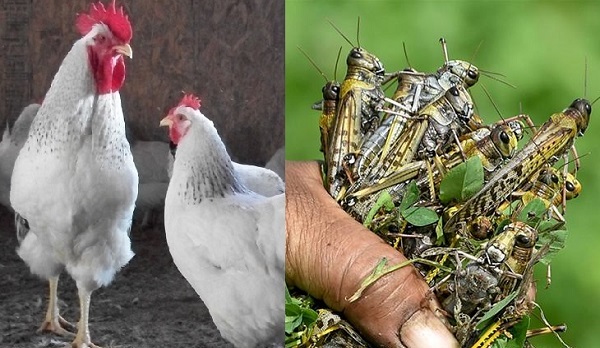
Pakistan turns locusts into chicken feed

Programme draws on efforts in war-ravaged Yemen where people were encouraged to eat protein-rich locusts amid famine.
Chickens in Pakistan have been feasting on captured locusts under an initiative to combat swarms of the insects that are threatening food supplies in the impoverished country.
Prime Minister Imran Khan has endorsed plans to expand a pilot project in the breadbasket province of Punjab, where villagers earned cash by gathering locusts that were then dried out, shredded and added to poultry feed.
Farmers are struggling as the worst locust invasion in 25 years wipes out entire harvests in Pakistan's agricultural heartlands, leaving people scrambling for income.
Muhammad Khurshid from Pakistan's food ministry and biotechnologist Johar Ali set up the programme, drawing on efforts in war-ravaged Yemen, where authorities have encouraged people to eat the protein-rich locusts amid famine.
The pair chose Punjab's Okara district, where farmers had not used any pesticides that would make locusts unsuitable for consumption.
"We first had to learn, and then teach the locals how to catch the locusts. Nets are useless against them," Khurshid told the AFP news agency.
At night, locusts cluster on trees and plants, making them easy to scoop up as they lie motionless in the cooler temperatures until the sun begins to rise.
For a reward of 20 rupees (12 cents) per kilogramme (roughly two pounds) of locusts, locals worked all night to collect them.
One farmer who lost all her crops to the insects said she and her son earned 1,600 rupees ($10) during a single locust-gathering outing, helping to offset the financial damage.
Organisers struggled at first to convince farmers to join the hunt but, by the third night, word had spread, and hundreds joined in - turning up with their own bags to stuff full.
With 20 tonnes of captured locusts, authorities ran out of money to pay the collectors and the programme was paused.
The ministry, which recently announced the results of February's pilot, is now preparing to expand the project to other locations.
The harvested locusts went to Hi-Tech Feeds - Pakistan's largest animal-feed producer - which substituted 10 percent of the soybean in its chicken food with the insects.
"There was no issue with the feed, the locusts have a good potential for use in poultry feed," general manage
Editor & Publisher: S. M. Mesbah Uddin
Published by the Editor from House-45,
Road-3, Section-12, Pallabi, Mirpur
Dhaka-1216, Bangladesh
Call: +01713180024 & 0167 538 3357
News & Commercial Office :
Phone: 096 9612 7234 & 096 1175 5298
e-mail: financialpostbd@gmail.com
HAC & Marketing (Advertisement)
Call: 01616 521 297
e-mail: tdfpad@gmail.com